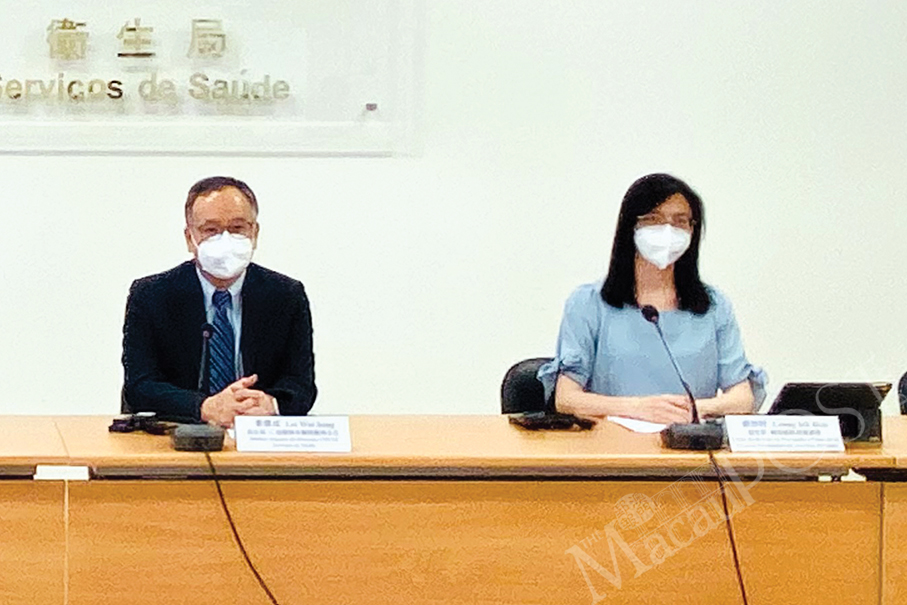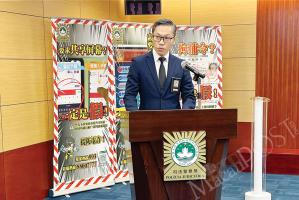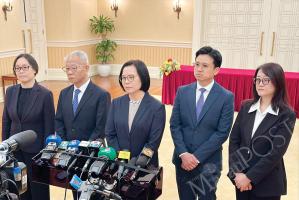2022-07-22 04:54 BY Tony Wong Comment:1
Macau’s COVID-19 death toll has increased to six as one more fatality was reported yesterday, a 93-year-old chronically ill man.
The government also announced yesterday that all Philippine nationals in the city, including those holding a Macau ID card, must undergo a COVID-19 nucleic acid test (NAT) every day from today.
Lei Wai Seng, a clinical director of the public Conde de São Januário Hospital Centre, announced the latest COVID-19 death during yesterday evening’s daily press conference about the city’s current outbreak, which was detected on June 18.
The man, who tested positive for COVID-19 on July 9, was taken to the Health Bureau’s (SSM) Public Health Clinical Centre in Coloane for isolation treatment, Lei said.
According to Lei, the man suffered various chronic diseases such as chronic heart disease and chronic pulmonary disease, which required him to receive long-term oxygen therapy at home.
The man underwent a chest CT scan after he was admitted to isolation, which did not show pneumonia, Lei said.
However, later during his treatment at the Public Health Clinical Centre, the patient came down with a fever and gastrointestinal bleeding, which then triggered a string of complications, Lei said.
Lei said that the man had been prescribed antiviral medicines and antibiotics during his treatment. The man later came down with renal and pulmonary dysfunction.
According to Lei, the senior citizen’s family members told doctors that they did not want him to receive invasive medical treatment.
Consequently, Lei said, the doctors gave him medicines and oxygen therapy that aimed to improve his condition.
However, Lei said, the man’s condition still did not improve, and he died at around 3 a.m. yesterday.
According to Lei, the man died of upper gastrointestinal bleeding, renal dysfunction and respiratory failure.
The man had lived in San Mei On Building in Iao Hon district before he was admitted to isolation, according to Lei.
San Mei On Building is one of the “Red Code Zone” buildings across the city that are being locked down due to the detection of COVID-19 cases.
Macau’s first two COVID-19 deaths were reported on July 3, while three others were reported on three consecutive days last week. All five previous COVID-19 death victims were chronically ill female senior citizens.
According to Lei, the man who died yesterday had not been vaccinated against COVID-19.
Three of the six COVID-19 fatalities had not been inoculated against COVID-19, while the other three had previously received two Sinopharm inactivated jabs.
Philippine nationals 9.5 pct of latest COVID-19 tally
Meanwhile, Leong Iek Hou, who heads the Communicable Disease Prevention and Control Division of the Health Bureau, announced during yesterday’s press conference that from today all Philippine nationals in Macau, including Macau residents holding a Philippine passport, must undergo a nucleic acid test every day.
Leong said that the Macau government has decided to also classify Philippine nationals in the city as a high-risk key group of people subject to a mandatory daily nucleic acid test after considering that Philippine nationals have accounted for a “high” percentage of the latest tally of Macau’s current COVID-19 outbreak.
According to a Novel Coronavirus Response and Coordination Centre statement yesterday morning, the latest tally of Macau’s current COVID-19 outbreak has increased by 12 to 1,795. The 12 new locally transmitted cases were detected between 00:00 a.m. and 11:59 p.m. on Wednesday, raising the outbreak tally from 1,783 as of Tuesday night to 1,795 as of Wednesday night.
The outbreak tally was up by 10 from 1,755 to 1,765 on Monday, and up by 18 to 1783 on Tuesday.
Yesterday morning’s statement said that 11 of the 12 new local cases reported on Wednesday were detected among COVID-19 carriers subject to management and control measures, namely lockdowns and hotel quarantine, while just one case was detected in the community, which was detected by mass nucleic acid tests or among high-risk key groups of people.
Leong said during the press conference that 171 out of the current outbreak’s latest tally of 1,795 are Philippine nationals – who do not include those holding a Macau ID card, or 9.5 percent of the tally. Leong said that this is a “high” percentage.
In addition to the high infection rate, Leong said, Philippine nationals in Macau meet each other very often, because of which the government aims to detect hidden COVID-19 cases among them by carrying out frequent nucleic acid tests on them.
Leong said that the government will decide how long Philippine nationals’ daily nucleic acid tests will last, depending on the results of their tests which start today.
The Health Bureau will send an SMS to the Philippine nationals in Macau telling them to undergo their mandatory nucleic acid tests. Those failing to undergo a test will have their Macau Health Code colour turn yellow the next day. Those whose health code colour has become yellow due to this reason will have it return to green after undergoing a test. If they still do not undergo a test, their health code colour will even turn red the day after.
Early this month, the Health Bureau reported the number of different nationalities among Macau’s then latest tally of the current COVID-19 outbreak, according to which Philippine nationals accounted for the highest percentage of the then tally among all foreign nationals, 6.1 percent.
When asked by The Macau Post Daily, the Macau government, as of last night, was unable to provide the number of Philippine nationals who are currently in Macau.
According to the latest data from the Labour Affairs Bureau (DSAL), Macau had 26,400 non-resident workers from the Philippines at the end of May.
According to a Consulate-General of the Philippines statement last night, there are around 30,000 Philippine nationals currently in Macau, including those holding a Macau ID card.
Those in seven occupations have been classified as high-risk key groups of people since earlier this month who are subject to a mandatory nucleic acid test every day, namely security, cleaning and building management staff, as well as restaurant staff, food deliverers, public bus drivers and taxi drivers, and live-out domestic helpers.
A seven-day period consolidating Macau’s achievements in its battle against the current COVID-19 outbreak will start at 00:00 tomorrow and is slated to end at 11:59 p.m. on Friday next week. The government announced on Wednesday that the seven key groups of people must continue to undergo a nucleic acid test every day from Sunday through Friday next week.
2 key areas
Meanwhile, Leong also announced during yesterday’s press conference that the government has classified two high-risk key areas subject to a mandatory daily nucleic acid test for three days from today to Sunday.
According to Leong, the mandatory tests cover those who live, work or engage in other activities in the two areas.
The two areas, according to Leong, are one in the vicinity of Rua do Seminário and Rua da Praia do Manduco, and the other in the vicinity of Luís de Camões Park and San Kio district.
Details about the two areas in English can be checked at: https://www.gov.mo/en/news/277105/.
According to Leong, the Health Bureau will send an SMS to those living in the two areas telling them to undergo their nucleic acid tests, based on home address information reported on the Macau Health Code.
Those failing to undergo a test will have their Macau Health Code colour turn yellow the next day. Those whose health code colour has become yellow will have it return to green after undergoing a test. If they still do not undergo a test, their health code colour will even turn red the day after.
Leong also said that those who have stayed in either of the two areas for more than half an hour on or after Monday (July 18) are also strongly advised to undergo the three nucleic acid tests from today to Sunday.
Leong said that the Health Bureau has decided to classify the two areas as high-risk key areas after considering that many of the recent COVID-19 community cases have been detected in the two areas.
Leong went on to say that the latest COVID-19 community cases detected by citywide nucleic acid tests over the past few days have all been from those living in the two areas.
Leong also said that according to the latest official data, around 20,000 people are currently living in the area around Rua do Seminário and Rua da Praia do Manduco, while around 15,000 people are living in the area around Luís de Camões Park and San Kio district.
According to Leong, no one, including those aged below three, senior citizens of an advanced age and those with disabilities, will be exempted from the mandatory tests for Philippine nationals or for those from the two key areas.
The government announced on Wednesday that it will carry out a new round of mandatory citywide nucleic acid tests for everyone after the upcoming seven-day consolidation period that will start tomorrow, on July 30-31. While those aged below three will continue to be exempted from mass nucleic acid tests during the July 30-31 testing round, senior citizens born on or before December 31, 1942 and residents with disabilities will no longer be exempted.
Tests for those leaving home for work
The government also announced on Wednesday that all those who go to work but are not in the seven key occupations will be required to undergo a nucleic acid test every other day from Sunday through Friday next week. The government noted that those subject to the tests will only cover those who have to leave home for work, meaning that those who work from home will not be required to undergo the tests. In addition, neither will live-in domestic helpers need to undergo the every-other-day tests if their employers do not tell them to go out home to buy food and other daily necessities.
During yesterday’s press conference, Leong explained more about the tests every other day, saying that all those who have left home for work between Wednesday (July 20) and Friday next week will be required to undergo a nucleic acid test every other day from Sunday through Friday next week. Leong underlined that the tests will cover all who leave home for work regardless of their daily working hours and occupations.
Philippine consulate urges compatriots to cooperate with testing drive
Meanwhile, the Philippine Consulate-General in Macau urged Philippine nationals to cooperate with the local government’s mandatory nucleic acid testing (NAT) drive, pointing out that cooperation and support is key for everyone in Macau, “a society that Filipinos are also part of.”
The Tagalog statement also urged Filipinos not to make the mandatory testing order a political issue and to look at it instead as a health issue that aims to achieve the aims of the zero-COVID policy.
The statement also pointed out that it’s not the first time that the local government has issued a mandatory testing order targeting a specific foreign community here.
According to the statement, about 30,000 Philippine nationals live and work in Macau.
Previously, the Macau government ordered non-resident workers from Nepal and Vietnam to undergo mandatory NATs. It also ordered a NAT order for nationals from Myanmar last month.

Health Bureau’s (SSM) Communicable Disease Prevention and Control Division chief Leong Iek Hou (right) and Lei Wai Seng, a clinical director of the public Conde de São Januário Hospital Centre, address yesterday’s press conference about the city’s current COVID-19 outbreak. Photo: GCS
 Macau, HK, Guangdong finetuning deal on joint emergency response in GBA: Macau fire chief
Macau, HK, Guangdong finetuning deal on joint emergency response in GBA: Macau fire chief
 Local victim of ‘fake police scam’ rescued by Macau cops in Mexico: PJ chief
Local victim of ‘fake police scam’ rescued by Macau cops in Mexico: PJ chief
 Govt rolls out its 6th-term CE electoral process
Govt rolls out its 6th-term CE electoral process